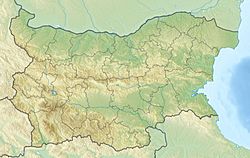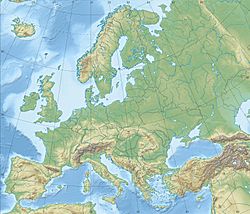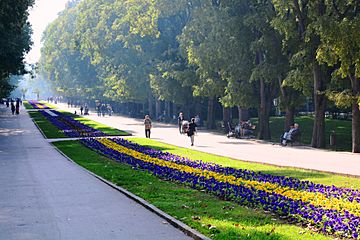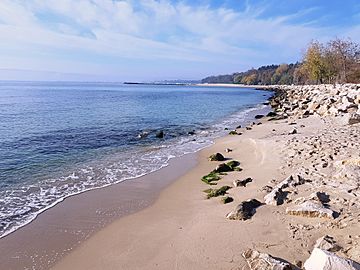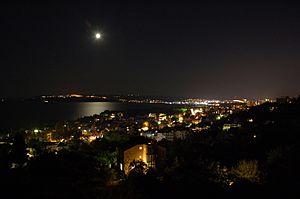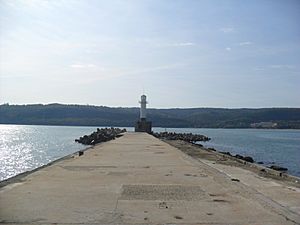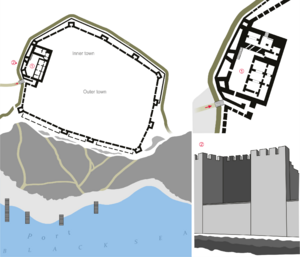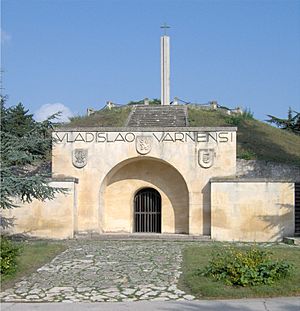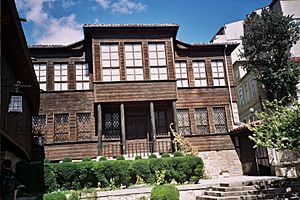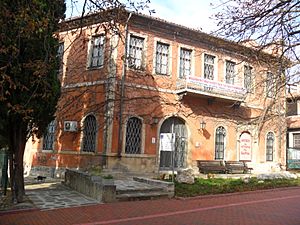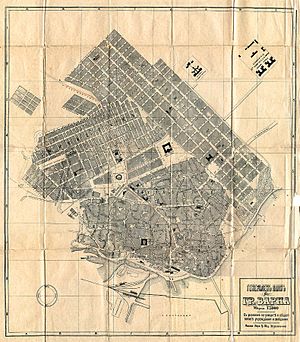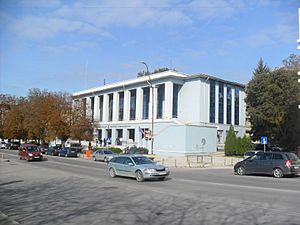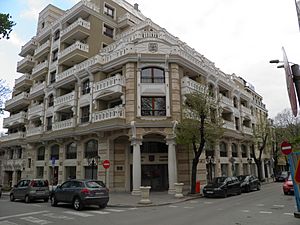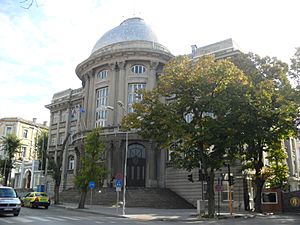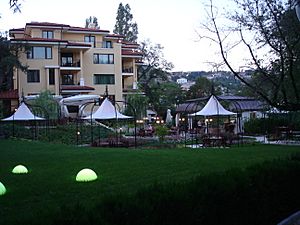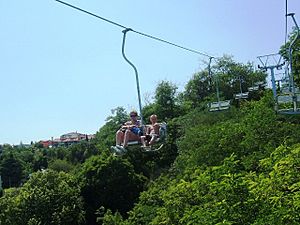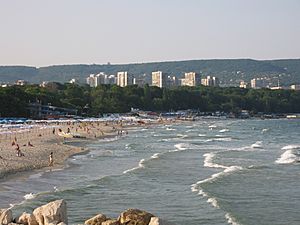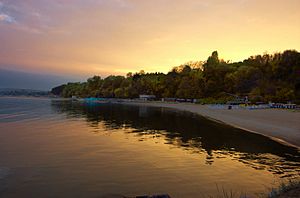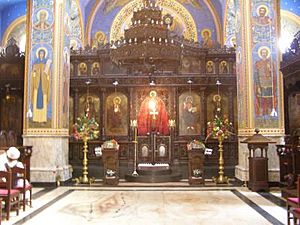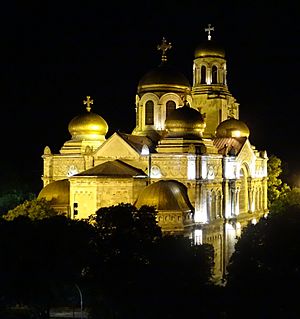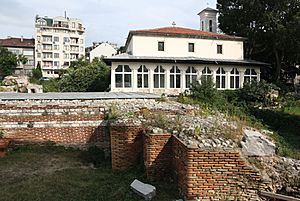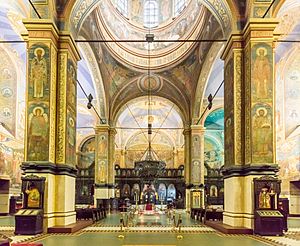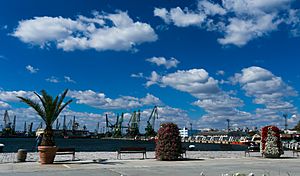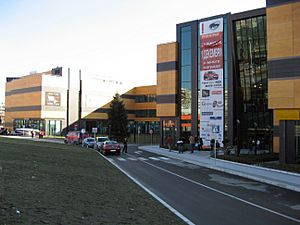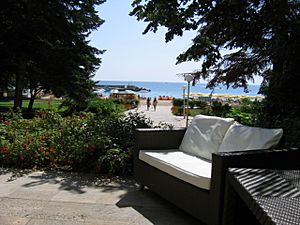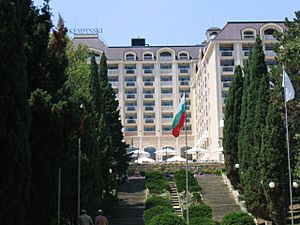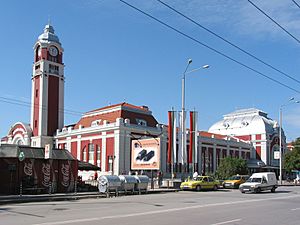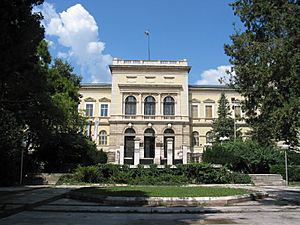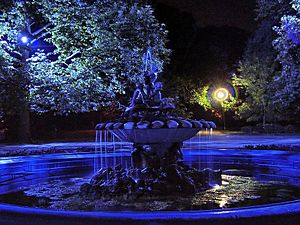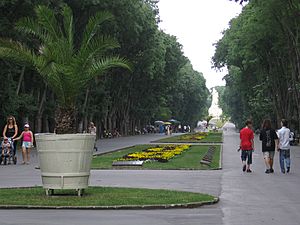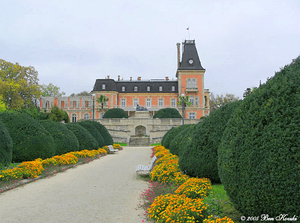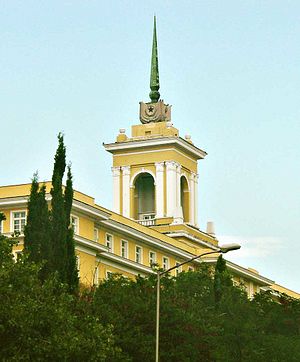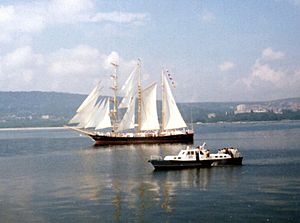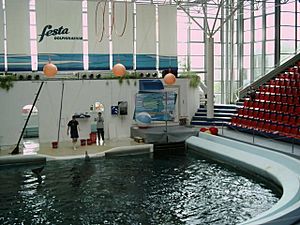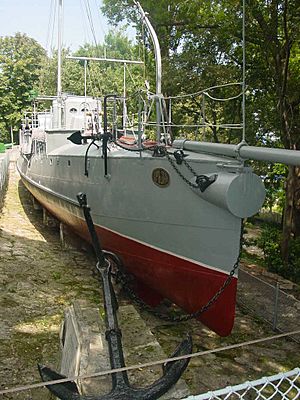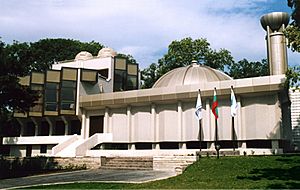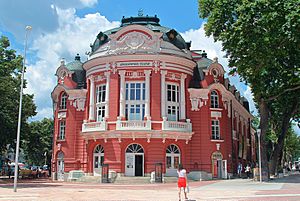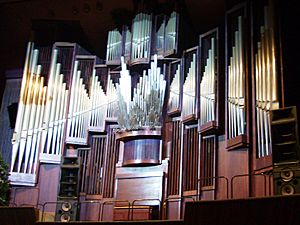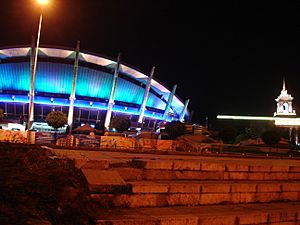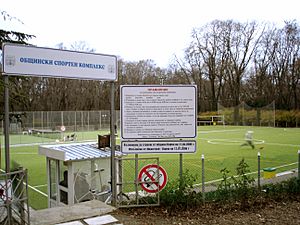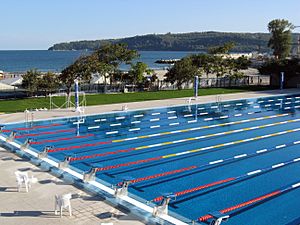Varna facts for kids
Quick facts for kids
Varna
Варна (Bulgarian)
|
|||
|---|---|---|---|
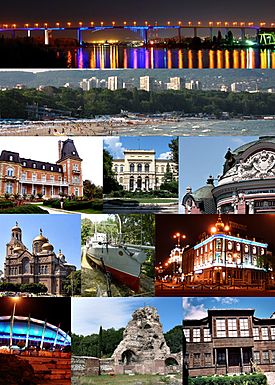
From top left: Asparuh Bridge, Black Sea beach, Euxinograd, Varna Archaeological Museum, Stoyan Bachvarov Dramatic Theatre, Dormition of the Mother of God Cathedral, Drazki torpedo boat, The Navy Club, Palace of Culture and Sports, The ancient Roman baths, Varna Ethnographic Museum
|
|||
|
|||
| Nickname(s):
Marine capital of Bulgaria, summer capital of Bulgaria
|
|||
| Country | Bulgaria | ||
| Province | Varna | ||
| Municipality | Varna | ||
| Established | 575 BCE | ||
| Area | |||
| • Total | 238 km2 (92 sq mi) | ||
| Elevation | 80 m (260 ft) | ||
| Population
(2017)
|
|||
| • City | 336,505 | ||
| • Urban | 418,108 | ||
| Demonym(s) | Varnéan | ||
| Time zone | UTC+2 (EET) | ||
| • Summer (DST) | UTC+3 (EEST) | ||
| Postcode |
9000
|
||
| Area code(s) | (+359) 52 | ||
Varna (Bulgarian: Варна) is the third-largest city in Bulgaria. It is the biggest city and seaside resort on the Bulgarian Black Sea Coast. Varna is in a great spot on the Gulf of Varna. It has been an important city for thousands of years. Varna used to be called Odessos (Ancient Greek: Ὀδησσός). It started as a small Thracian village by the sea. Then it grew into a big seaport on the Black Sea.
Varna is a key place for business, transportation, education, tourism, entertainment, and healthcare. People call it the "maritime capital" of Bulgaria. It is home to the Bulgarian Navy and merchant ships. In 2008, the Council of Europe chose Varna as the center for the Black Sea Euroregion. In 2014, Varna was named the European Youth Capital for 2017.
The oldest gold treasure ever found was discovered here! It's from the Varna Necropolis and is super old. This treasure dates back to 4200–4600 BC. It belongs to the Varna culture.
Contents
What Does the Name Varna Mean?
The name 'Varna' was first written down by Theophanes the Confessor. This happened when the Slavs took over the Balkans in the 6th to 7th centuries. The name might come from the Varangians. These were people who traveled across the Black Sea a lot. In Swedish, värn means "shield" or "defense." So, Varna could mean "defended place."
Some people think the name is even older. It might come from an ancient word meaning "to flow" or "water." Or it could come from a word meaning "black." Another idea is that it comes from an Iranian word for "camp" or "fortress."
In 680, Asparukh, who started the First Bulgarian Empire, defeated an army near the Danube River. He chased them to "the place called Varna, near Odyssos." Maybe the new name first referred to a river, a lake, or a Roman army camp nearby. Later, it became the name of the city itself. By the late 900s, 'Varna' was so well-known that even when the Byzantines took control, they kept the name.
Other Places Named Varna
- The Varna Peninsula on Livingston Island in Antarctica is named after Varna.
- Varna, Illinois, a small town in the USA, was named in honor of this city. This happened during the War of Varna.
- The Varnensky District in Russia is named after Varna. This was to remember when the Russian army captured Varna in the 1828–1829 Russo-Turkish War.
- Varna Drive in Toronto, Canada, is also named after Varna. There is also a small village called Varna in southern Ontario.
- An area near Aarhus, Denmark, is called Varna. It was named by a baron who fought in a Russian war near the Black Sea.
History of Varna
Ancient Times
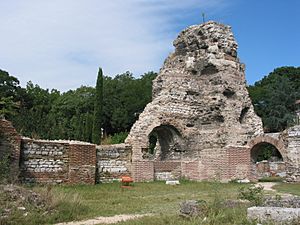
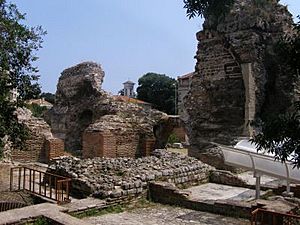
Long ago, Varna was called Odessos or Odessus (Ancient Greek: Ὀδησσός). It is one of the oldest ancient settlements in Bulgaria. Greek people from Miletus started a trading post here between 585–550 BC. This was on top of an older Thracian village. Odessos was a mix of Ionian Greeks and Thracian tribes. They traded a lot with each other.
Odessos was part of the Delian League in 425 BC. In 339 BC, Philip II of Macedon tried to attack it but failed. However, it surrendered to Alexander the Great in 335 BC. Later, it was ruled by Lysimachus, one of Alexander's generals. The city became very rich from sea trade.
The Romans took over Odessos in 15 AD. It became part of the province of Moesia. The Roman city covered a large area in what is now central Varna. It had huge public baths called Thermae. These were built in the late 100s AD. They are the biggest Roman ruins in Bulgaria and the fourth-largest Roman baths in Europe. This shows how important the city was!
Odessos was one of the first places to become Christian. There are ruins of many old churches here. In 442, a peace treaty between Theodosius II and Attila the Hun was signed in Odessos. In 536, Justinian I made it a very important military center.
Bulgarian Control
It is believed that the peace treaty that created the new Bulgarian state in 681 AD was signed in Varna. The first Bulgarian capital south of the Danube River might have been near Varna. Asparukh built a wall, called Asparuhov val, to protect the area. Many old Bulgarian settlements have been found around Varna.
Middle Ages
Control of Varna changed many times between the Byzantines and Bulgarians. In the late 800s and early 900s, Varna had an important writing center. Monks there copied books and helped create the Cyrillic alphabet. Some people think Boris I, a Bulgarian ruler, might have been buried here.
By the late 1200s, Varna became a busy trading port. Ships from Genoa, Venice, and Ragusa came here. They traded wheat, animal skins, honey, wine, and wood. They imported fancy foods and luxury items. Varna even had its own money! Crafts like jewelry making, pottery, and shipbuilding were popular.
Old maps from the 1300s show Varna as a very important port between Constantinople and the Danube River. In 1366, Amadeus VI of Savoy tried to capture Varna but failed. The Ottomans took over Varna in 1389.
The Battle of Varna
On November 10, 1444, a very important battle happened outside Varna. It was one of the last big Crusades in Europe. A large army of crusaders, led by Ladislaus III of Poland, gathered at the port. They planned to sail to Constantinople. But a much bigger Ottoman army, led by sultan Murad II, attacked them. Ladislaus III was killed trying to capture the sultan. This battle's failure meant that Constantinople would likely fall to the Ottomans soon. Varna and all of Bulgaria stayed under Ottoman rule for over 400 years. Today, there is a memorial for Ladislaus III in Varna.
Later Ottoman Rule
Varna was a big port and trade center for the Ottoman Empire in the 1500s and 1600s. It had many Bulgarian people living there. Later, it became one of the "Quadrilateral Fortresses." These fortresses helped the Ottomans control the area during wars with Russia. The Russians took Varna twice, in 1773 and 1828. But they gave it back to the Ottomans two years later.
In the early 1800s, many local Greeks joined a group that wanted Greece to be free. When the Greek War of Independence started in 1821, there was revolutionary activity in Varna. Some local leaders were killed by the Ottomans, while others escaped to Greece.
During the Crimean War (1854–1856), the British and French armies used Varna as their main base. Many soldiers died from cholera, and a fire destroyed much of the city. In 1866, the first railroad in Bulgaria connected Varna to Rousse on the Danube River. This linked the Ottoman capital, Constantinople, with Central Europe. Varna's port grew, supplying food to Constantinople and importing goods from Europe. Many foreign countries opened consulates in the city.
Modern Bulgaria
In 1878, Russian troops gave Varna to Bulgaria. Varna became a front-line city in the First Balkan War and First World War. Its economy suffered when parts of its farming land were lost to Romania. In Second World War, the Red Army took the city in September 1944. This helped set up communist rule in Bulgaria.
Varna became a center for industry and the labor movement. It grew into Bulgaria's main export port. It was also a big farming and wine-making area. Varna became home to the country's oldest university outside Sofia. It also became a popular place for international festivals. The Euxinograd royal summer palace was built here. The Bulgarian government still holds summer meetings there. Mass tourism started in the late 1950s. Industry and trade with the Soviet Union grew a lot from the 1950s to the 1970s.
From 1949 to 1956, the city was renamed Stalin by the communist government. This was after the Soviet leader Joseph Stalin.
Varna became a popular holiday spot for people from Eastern Europe. They could not travel to Western countries until 1989.
Geography and Climate
Varna covers 238 square kilometers. It sits on green hills that slope down to the Gulf of Varna and Lake Varna. Two man-made waterways connect the bay and the lake. The Asparuhov most bridge crosses these waterways. For a long time, vineyards, orchards, and forests have surrounded the city.
Varna has over 20 kilometers of sandy beaches. It also has many hot mineral water springs. The city has a mild climate because of the sea. Summers are sunny and warm, but cool breezes keep them from being too hot. Winters can be cold with snow, but it often melts quickly. The Black Sea water is clean and has low salt content. It also doesn't have large dangerous animals.
Varna is 470 kilometers northeast of Sofia. Other big cities nearby are Dobrich (45 km north), Shumen (80 km west), and Burgas (125 km southwest).
Varna's Weather
Varna has an oceanic climate. This means it has mild weather with influences from the sea. The sea makes the climate milder than other parts of Bulgaria. It also lessens the effect of cold winds from the northeast. Varna gets less rain than most of Bulgaria. Summers last from early May to early October. Temperatures in summer are usually 27–30°C during the day and 17–18°C at night. The sea water temperature is usually 24–27°C in summer. In winter, temperatures are about 6–7°C during the day and around 0°C at night. Snow can fall but often melts fast.
| Climate data for Varna (1952–2011) | |||||||||||||
|---|---|---|---|---|---|---|---|---|---|---|---|---|---|
| Month | Jan | Feb | Mar | Apr | May | Jun | Jul | Aug | Sep | Oct | Nov | Dec | Year |
| Record high °C (°F) | 21.2 (70.2) |
22.5 (72.5) |
29.5 (85.1) |
29.0 (84.2) |
34.0 (93.2) |
38.0 (100.4) |
41.4 (106.5) |
38.9 (102.0) |
37.2 (99.0) |
33.0 (91.4) |
27.0 (80.6) |
21.2 (70.2) |
41.4 (106.5) |
| Mean daily maximum °C (°F) | 6.0 (42.8) |
7.2 (45.0) |
10.2 (50.4) |
14.8 (58.6) |
20.4 (68.7) |
25.1 (77.2) |
26.6 (79.9) |
26.6 (79.9) |
23.9 (75.0) |
18.6 (65.5) |
12.7 (54.9) |
8.1 (46.6) |
17.0 (62.6) |
| Daily mean °C (°F) | 1.9 (35.4) |
2.8 (37.0) |
5.7 (42.3) |
10.3 (50.5) |
15.4 (59.7) |
19.9 (67.8) |
21.9 (71.4) |
21.8 (71.2) |
18.3 (64.9) |
13.5 (56.3) |
8.4 (47.1) |
4.1 (39.4) |
12.4 (54.3) |
| Mean daily minimum °C (°F) | −1.7 (28.9) |
−1.1 (30.0) |
1.7 (35.1) |
6.1 (43.0) |
10.8 (51.4) |
15.0 (59.0) |
17.2 (63.0) |
17.1 (62.8) |
13.5 (56.3) |
9.1 (48.4) |
4.6 (40.3) |
0.5 (32.9) |
7.8 (46.0) |
| Record low °C (°F) | −19.0 (−2.2) |
−24.3 (−11.7) |
−13.5 (7.7) |
−5.0 (23.0) |
0.0 (32.0) |
0.0 (32.0) |
7.0 (44.6) |
0.0 (32.0) |
0.0 (32.0) |
−7.7 (18.1) |
−10.0 (14.0) |
−17.0 (1.4) |
−24.3 (−11.7) |
| Average precipitation mm (inches) | 31.8 (1.25) |
29.9 (1.18) |
43.7 (1.72) |
57 (2.2) |
43.9 (1.73) |
57.6 (2.27) |
50.7 (2.00) |
41.4 (1.63) |
44.1 (1.74) |
42.6 (1.68) |
55.6 (2.19) |
42 (1.7) |
540.3 (21.27) |
| Average precipitation days | 13.5 | 11.3 | 11.9 | 9.3 | 6.9 | 6.2 | 4.7 | 3.3 | 6.5 | 9.6 | 8.9 | 11.5 | 103.6 |
| Average relative humidity (%) | 77.9 | 75 | 73.3 | 73.7 | 74.8 | 72.5 | 69.7 | 69.4 | 73.1 | 77.6 | 78.1 | 79 | 74.5 |
| Mean monthly sunshine hours | 89.9 | 102.2 | 142.6 | 180.0 | 248.0 | 270.0 | 300.7 | 299.2 | 219.0 | 167.4 | 105.0 | 79.1 | 2,203 |
| Mean daily sunshine hours | 2.9 | 3.7 | 4.6 | 6.0 | 8.0 | 9.0 | 9.7 | 9.7 | 7.3 | 5.4 | 3.5 | 2.6 | 6.0 |
| Percent possible sunshine | 32 | 34 | 38 | 46 | 53 | 60 | 65 | 69 | 61 | 49 | 35 | 29 | 48 |
| Source 1: Climatebase.ru | |||||||||||||
| Source 2: Weather Atlas (sunshine data) | |||||||||||||
| Climate data for Varna | |||||||||||||
|---|---|---|---|---|---|---|---|---|---|---|---|---|---|
| Month | Jan | Feb | Mar | Apr | May | Jun | Jul | Aug | Sep | Oct | Nov | Dec | Year |
| Average sea temperature °C (°F) | 8.0 (46.4) |
7.3 (45.1) |
7.7 (45.9) |
9.7 (49.5) |
15.8 (60.4) |
21.5 (70.7) |
24.5 (76.1) |
24.8 (76.6) |
22.7 (72.9) |
17.8 (64.0) |
13.2 (55.8) |
9.9 (49.8) |
15.2 (59.4) |
| Mean daily daylight hours | 9.0 | 11.0 | 12.0 | 13.0 | 15.0 | 15.0 | 15.0 | 14.0 | 12.0 | 11.0 | 10.0 | 9.0 | 12.2 |
| Average ultraviolet index | 1 | 2 | 3 | 5 | 7 | 8 | 9 | 7 | 5 | 3 | 2 | 1 | 4.4 |
| Source: Weather Atlas | |||||||||||||
| Weather chart for Varna (2004–2016) | |||||||||||||||||||||||||||||||||||||||||||||||
|---|---|---|---|---|---|---|---|---|---|---|---|---|---|---|---|---|---|---|---|---|---|---|---|---|---|---|---|---|---|---|---|---|---|---|---|---|---|---|---|---|---|---|---|---|---|---|---|
| J | F | M | A | M | J | J | A | S | O | N | D | ||||||||||||||||||||||||||||||||||||
|
50
7
-1
|
45
8
0
|
72
12
3
|
97
16
7
|
98
22
13
|
106
26
17
|
97
30
20
|
99
30
20
|
88
25
17
|
71
19
11
|
82
14
7
|
71
10
2
|
||||||||||||||||||||||||||||||||||||
| temperatures in °C precipitation totals in mm source: [1] |
|||||||||||||||||||||||||||||||||||||||||||||||
|
Imperial conversion
|
|||||||||||||||||||||||||||||||||||||||||||||||
How Varna is Governed
Varna is the main city for Varna county. The Varna municipality includes the city and five nearby villages. These villages are Kamenar, Kazashko, Konstantinovo, Topoli, and Zvezditsa. They are all connected by the city's public transport.
Local Government
The city's main leader is the Mayor. Since 1990, Varna has had four mayors. The current mayor is Ivan Portnih.
The City Council is like the city's parliament. It has 51 members. As of 2015, the GERB party had the most members. The Council chairman is Todor Balabanov.
Varna has several courts, including a regional court and a military court.
City Areas and Planning
The city is split into five main areas called boroughs. Each borough has its own mayor and council. These boroughs are Asparuhovo, Mladost, Odessos (the old city center), Primorski, and Vladislav Varchenchik. Primorski is the biggest borough. It includes the seaside resorts north of the city.
- List of Varna City Boroughs and Districts
| District | Cyrillic | Borough | Population |
|---|---|---|---|
| Vladislav Varnenchik | Владислав Варненчик | Vladislav Varnenchik | 48,740 |
| Kaisieva Gradina (Apricot Garden) | Кайсиева градина | Vladislav Varnenchik | 48,740 |
| Troshevo | Трошево | Mladost | 87,256 |
| Mladost (Youth) | Младост | Mladost | 87,256 |
| Chayka (Seagull) | Чайка | Primorski | 105,340 |
| Central borough | Център | Odessos | 82,784 |
| Asparuhovo | Аспарухово | Asparuhovo | 27,178 |
| Vinitza | Виница | Primorski | 105,340 |
| Zlatni pyasatsi (Golden Sands) | Златни пясъци | Primorski | 105,340 |
| Hristo Botev | Христо Ботев | Odessos | 82,784 |
| Galata | Галата | Asparuhovo | 27,178 |
| Vazrazhdane (Revival) | Възраждане | Mladost | 87,256 |
| Pobeda (Victory) | Победа | Mladost | 87,256 |
| Zapadna promishlena zona (West Industrial Zone) | Западна промишлена зона | Mladost | 87,256 |
Foreign Consulates
Varna has consulates for many countries. These include the Czech Republic, Denmark, Finland, France, Germany, Hungary, Indonesia, Israel, Italy, Norway, Russia, South Africa, Spain, Sweden, and Ukraine.
Sister Cities
Varna is twinned with cities around the world:
 Barcelona, Spain
Barcelona, Spain Bari, Italy
Bari, Italy Bradford, England, United Kingdom
Bradford, England, United Kingdom Cape Town, South Africa
Cape Town, South Africa Dordrecht, Netherlands
Dordrecht, Netherlands Genoa, Italy
Genoa, Italy Kharkiv, Ukraine
Kharkiv, Ukraine Marseille, France
Marseille, France Ningbo, China
Ningbo, China Novorossiysk, Russia
Novorossiysk, Russia Novosibirsk, Russia
Novosibirsk, Russia Rostock, Germany
Rostock, Germany Strasbourg, France
Strasbourg, France Surabaya, Indonesia
Surabaya, Indonesia Turku, Finland
Turku, Finland
People of Varna
In 1881, Varna had 24,555 people. It was the second-largest city in Bulgaria then. For the next 120 years, Varna stayed the third-largest city.
In January 2012, Varna had 334,781 people. This makes it the third-largest city in Bulgaria. The Varna Municipality, including nearby villages, had 343,643 people. Varna is one of the few cities in Bulgaria where more babies are born than people die.
Some sources say Varna's population is much higher, even over 500,000. This is because many people live here but are not officially counted. During summer, Varna attracts 2 to 3 million tourists. This means about 600,000 people can be in the city in July and August.
| Varna | |||||||||||||||
|---|---|---|---|---|---|---|---|---|---|---|---|---|---|---|---|
| Year | 1887 | 1910 | 1934 | 1946 | 1956 | 1965 | 1975 | 1985 | 1992 | 2001 | 2005 | 2009 | 2011 | 2013 | |
| Population | 25,256 | 41,419 | 69,563 | 76,954 | 120,345 | 180,633 | 253,039 | 302,816 | 308,601 | 312,889 | 312,026 | 320,837 | 334,870 | ?? | |
| Highest number ' in ' | |||||||||||||||
| Sources: National Statistical Institute, citypopulation.de, pop-stat.mashke.org, Bulgarian Academy of Sciences | |||||||||||||||
Ethnic and Religious Groups
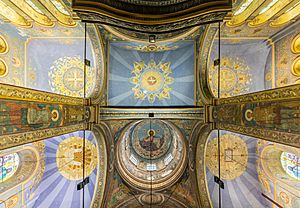
Most people in Varna are Bulgarians (94%). The second largest group is Turks (3%). However, there are also many Russians and other Russian-speaking immigrants. There are also more Asian and African students and workers. About 1% of the population are Romani. Other groups include Armenians, Greeks, and Jews.
In the past, Varna had more Turks and Greeks. But after wars, many Bulgarian refugees moved to Varna. This made Bulgarians the main group.
According to the 2011 census, here's the breakdown of ethnic groups:
- Bulgarians: 284,738 (93.8%)
- Turks: 10,028 (3.6%)
- Romani: 3,162 (1.0%)
- Others: 3,378 (1.1%)
- Not sure: 2,288 (0.8%)
- Did not say: 31,276 (10.3%)
Total: 334,781
Churches and Other Religious Buildings
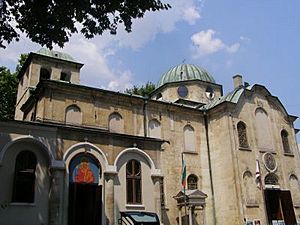
Varna has many old Orthodox churches. The main one is the Dormition of the Theotokos Cathedral. Others include the Theotokos Panagia (from the 1600s), the St. Athanasius church, and the St. Petka Parashkeva chapel. There is also the seamen's church of Saint Nicholas.
The remains of a large old church from the 300s-400s are in Dzhanavara Park. They have beautiful mosaics. Other old churches are also being restored.
Varna also has an Armenian Apostolic church. There are two Roman Catholic churches and a Methodist church. You can also find Pentecostal, Seventh-day Adventist, and Baptist churches.
Two old mosques from Ottoman times are still standing. There are also two old synagogues, one of which is being restored. A new mosque was recently built in the Asparuhovo district. There is also a Buddhist center in Varna.
Varna's Economy
Varna's economy is doing very well and growing fast. In 2016, the unemployment rate was low (3.5%). Most of the money comes from trade and tourism (61%). Manufacturing makes up 16%, and transportation and communication 14%. Financial services like banking and insurance are also growing.
Varna is the eastern end of a major European transport route (Corridor 8). It is also connected to other routes. Key industries include shipping (Navibulgar, Port of Varna), shipbuilding, and ship repair.
Varna and the nearby towns of Beloslav and Devnya form a big industrial area. This area has some of Bulgaria's largest chemical and power plants.
Tourism is very important. Resorts like Golden Sands, Riviera Holiday Club, Sunny Day, and Saints Constantine and Helena attract about 1 million foreign tourists each year. These resorts have received a lot of money for improvements. They are also far from industrial areas, so they are good for the environment. Varna is also Bulgaria's only international cruise destination.
The tallest building in Varna is Interhotel Cherno More, which is 72.2 meters high.
Real estate prices grew quickly from 2003 to 2008. In 2017, Varna was second in Bulgaria for new construction projects.
Varna has many international stores. It also has its own successful Bulgarian chains, like the supermarket Piccadilly and the restaurant chain Happy. Mall Varna, Grand Mall, and Delta Planet Mall are the biggest shopping centers. Varna has many great restaurants, including places with food from different countries.
There are many internet cafes and free public Wi-Fi spots. Varna is connected to other Black Sea cities by a special underwater internet cable.
In 2016, Varna was voted "Best city to live" and "Protector of History" by radio listeners.
Getting Around Varna
You can reach Varna by plane, sea, train, or bus. Major roads connect Varna to cities like Bucharest, Istanbul, and Constanta. There are also highways to Sofia and Burgas.
Buses go to many Bulgarian and international cities. There are also train and ferry services to places like Odessa, Ukraine, and Poti, Georgia.
Varna's public transport system is modern. It includes buses, trolleybuses, and minibuses. Taxis are also widely available.
Places to See in Varna
Some famous places to visit include the Varna Archaeological Museum. It shows the amazing Gold of Varna. You can also see the Roman Baths and the Battle of Varna Park Museum. The Naval Museum has a real museum ship, the Drazki torpedo boat. The Museum of Ethnography shows how people lived in Varna long ago.
You can use a Varna City Card to see many of these places. It also gives you discounts at restaurants and bars.
The 'Sea Garden' is the oldest and biggest park in Varna. It has an open-air theater for shows and concerts. Inside the park, you'll find the Varna Aquarium, the Festa Dolphinarium, and the Nicolaus Copernicus Observatory and Planetarium. There's also a Museum of Natural History, a zoo, and a children's amusement park. The park is a national treasure for its beautiful design.
The waterfront has many beach clubs. They play different kinds of music like rock, hip-hop, and pop. Varna is known for its music scene and events.
Varna's beaches have hot mineral water springs. These are used for spas and swimming pools. The Asparuhov most bridge is a popular spot for bungee jumping. Outside the city, you can visit the Euxinograd palace and winery. There's also the Pobiti Kamani rock formations and the medieval cave monastery, Aladzha.
For shopping, you can explore the streets with boutiques or the big malls in the Mladost district. There are also farmers' markets for fresh local food.
Varna has many seagulls and brown squirrels in the Sea Garden. In winter, migrating swans come to the sheltered beaches.
Education and Learning
In 2016, Varna had over 37,000 students.
Universities in Varna
- University of Economics Varna: This university started in 1920. It is the second oldest university in Bulgaria.
- Nikola Vaptsarov Naval Academy: This is the oldest technical school in Bulgaria. It started in 1881 as a Maritime School.
- Medical University Varna: Founded in 1961, this university is known for its good medical education. Students from many countries study here.
- Technical University of Varna: This university started in 1962 as an engineering institute.
- Chernorizets Hrabar Varna Free University: This was the first private university in Varna, founded in 1991. It focuses on economics, law, and architecture.
Research and Colleges
Varna has four research institutes from the Bulgarian Academy of Sciences. These include institutes for Oceanology, Fisheries, and Aero and Hydrodynamics. The Institute of Oceanology has studied the Black Sea and done underwater archaeology.
Colleges include the College of Tourism and the Higher School of Management. Some other universities also have local branches in Varna.
High Schools
Some of the best high schools in Varna are:
- First Language School (English and German)
- Dr. Petar Beron Second High School of Mathematics
- Acad. Metodi Popov Third High School of Science and Mathematics
- Frédéric Joliot-Curie Fourth Language School (French and Spanish)
- John Exarch Fifth Language School (English, German, and French)
- Constantine of Preslav National High School for the Humanities and Arts
- Dobri Hristov National School of Arts (music, dance, and art)
Libraries
- Pencho Slaveikov Public Library
Culture and Arts
Varna has some of the oldest and best museums and arts groups in Bulgaria. It is known for its long history in art, music, and books. It also has a lively modern music scene. Varna has become a famous place for international festivals. It is a candidate for European Capital of Culture in 2019.
Museums to Explore
- Varna Archaeological Museum (started 1888)
- Naval Museum (started 1923)
- Roman Baths
- Aladzha Monastery
- Battle of Varna Park Museum (started 1924)
- Museum of Ethnography
- National Revival Museum
- History of Varna Museum
- History of Medicine Museum
- Health Museum (for children)
- Puppet Museum (old puppets from shows)
- Aquarium (started 1912)
- Nicolaus Copernicus Observatory and Planetarium
- Naval Academy Planetarium
- Museum of Natural History
- Terrarium
- Varna Zoo
- Dolphinarium (started 1984)
Art Galleries
- Boris Georgiev City Art Gallery
- Georgi Velchev Gallery
- Modern Art Centre
- Print Gallery
- Many smaller art galleries
Performing Arts
- Opera and Philharmonic Society (for opera, music, and ballet)
- Stoyan Bachvarov Drama Theatre (started 1921)
- State Puppet Theatre Varna (started 1952, known as one of the best in Bulgaria)
- Bulgarian Theatre
- Varna Ensemble (traditional folk music and dance)
Concert Halls
- Festival and Congress Centre (built 1986, for concerts, films, and shows)
- Palace of Culture and Sports (built 1968, for sports, concerts, and exhibitions)
Festivals and Events
Varna hosts many international and national festivals:
- Varna Summer International Music Festival (annual)
- Varna International Ballet Competition (every two years)
- Varna Summer International Jazz Festival (annual)
- International Folk Festival (annual)
- Love is Folly film festival (annual)
- Golden Rose Bulgarian Feature Film Festival
- Navy Day (second Sunday of August)
- Dormition of the Theotokos festival, Varna Day (August 15)
- New Year's Eve concert and fireworks
Healthcare in Varna
Varna has several hospitals and clinics:
- Dentaprime Clinic (for dental care)
- Kamee Clinic (for plastic surgery)
- Dr. Marko Markov Oncological Dispensary
- Navy Hospital
- Obstetrics and Gynecology Hospital
- Sveta Anna Hospital
- Sveta Marina University Hospital
- Sveta Petka Ophthalmology Clinic
Sports in Varna
Football
Football is very popular in Varna. The city has two main teams in Bulgaria's top league: Cherno More and Spartak. Cherno More has won the national championship four times. Spartak has won once and played in a European competition in 1983.
There are plans to rebuild the Yuri Gagarin Stadium to meet international standards.
Swimming
Modern Bulgarian swimming started in Varna in 1923. The Bulgarian Public Marine Union was the first group to organize swimming as a sport. Famous swimmers from Varna include Aleksi Aleksiev and Milko Rachev.
The "Julian Rusev" pool is the second oldest 50-meter Olympic-size pool in Bulgaria. It was built in 1964. There are also other swimming pools in the city.
Every year, on the first Sunday of August, there is a swimming marathon called "Galata – Varna." It is the oldest swimming marathon in Bulgaria. Swimmers cross the 4.5 km Varna Bay. Bulgaria's greatest swimmer, Petar Stoychev, holds the record for this race.
Other Sports
Other popular sports include men's basketball, women's volleyball, gymnastics, boxing, martial arts, sailing, and tennis.
Varna has a karting racing and a go kart track and a hippodrome for horseback riding. The Asparuhov bridge is a popular spot for bungee jumping. Cricket has also been introduced by people from other countries.
In 2007, a new public sports center opened in the Mladost district. It has fields for football, basketball, and volleyball. It also has mini-golf, tennis, and ice-skating. More sports centers have opened in the Sea Garden and Asparuhov Park.
There are three professional golf courses near Varna. These are Lighthouse Golf Club, BlackSeaRama Golf & Villas, and Thracian Cliffs Golf & Beach Resort.
Varna often hosts international and national sports events. The Palace of Culture and Sports hosts games for the Bulgarian national basketball and volleyball teams. Varna athletes have won medals at the Olympics.
See also
 In Spanish: Varna para niños
In Spanish: Varna para niños
 | John T. Biggers |
 | Thomas Blackshear |
 | Mark Bradford |
 | Beverly Buchanan |




